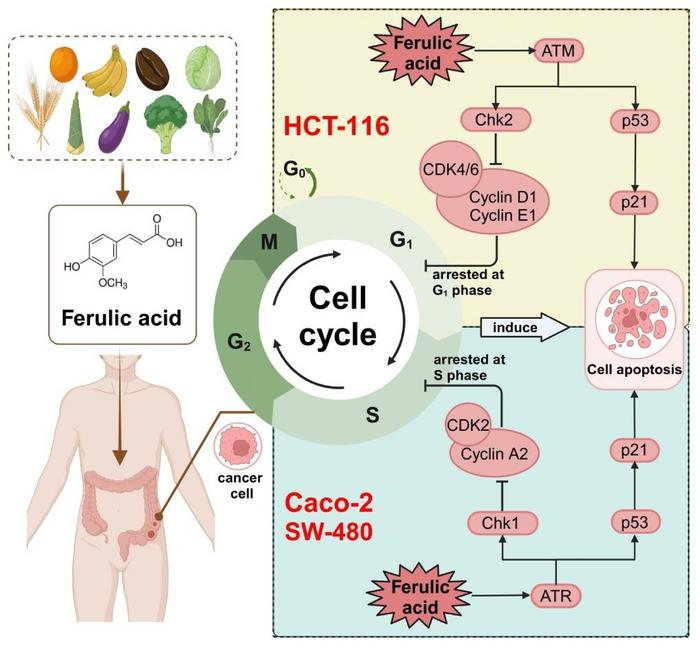
The Promising Role of Ferulic Acid in Colon Cancer Prevention: New Insights from Recent Research
Colon cancer remains one of the most pressing health concerns globally, consistently ranking as a leading cause of cancer-induced mortality. Researchers continually seek safe and effective means to combat this malignancy, particularly focusing on dietary components due to their widespread availability and potential health benefits. Recent findings have spotlighted ferulic acid, a naturally occurring phenolic compound prevalent in many fruits, vegetables, and grains. This study delves into the intricate mechanisms by which ferulic acid could impede the development and progression of colon cancer at various stages.
Derived primarily from plant sources, ferulic acid is known for its potent antioxidant properties, which play a crucial role in neutralizing free radicals and reducing oxidative stress within cells. Oxidative stress has long been associated with carcinogenesis, making it essential to understand how dietary antioxidants like ferulic acid can offer protective benefits. The interest in ferulic acid has surged due to its dual function: as an antioxidant and a potential chemopreventive agent against various types of cancer, including colon cancer.
In a groundbreaking study published in Food & Medicine Homology, a team of researchers from Wuhan Polytechnic University and Kansas State University embarked on a comprehensive investigation to evaluate the effects of ferulic acid on three human colon cancer cell lines: SW-480, Caco-2, and HCT-116. These cell lines represent distinct stages of colon cancer, providing a unique perspective into how ferulic acid may function differently depending on the cancer’s progression. The research focused on evaluating the compound’s ability to inhibit cell proliferation and migration, alongside its capability to induce apoptotic processes.
Initial results revealed that ferulic acid exhibited significant anti-proliferative effects across all tested cell lines in a dose-dependent manner. HCT-116 cells, representing a more advanced stage of cancer, demonstrated the highest sensitivity to ferulic acid, suggesting that later stages of colon cancer might be more susceptible to intervention with this compound. These findings are particularly promising, as they indicate that dietary incorporation of ferulic acid could be strategically beneficial, especially for individuals at higher risk of advanced colon cancer.
To further substantiate the claim of ferulic acid’s efficacy in curtailing cancer cell proliferation, the researchers employed colony formation assays. These assays confirmed that ferulic acid indeed stifled tumor growth by inhibiting the number of colonies formed by cancer cells. The effects observed during the migration assays were equally compelling; ferulic acid significantly curtailed cell movement in various tests, suggesting a potential role in reducing metastasis—a critical factor in improving prognosis for cancer patients.
Mechanistically, the study turned its focus toward the intricate signaling pathways activated by ferulic acid. It was discovered that treatment with ferulic acid induced cell cycle arrest in the SW-480 and Caco-2 cells at the S phase via the ATR/Chk1 signaling pathway. In contrast, in the HCT-116 cells, the arrest occurred at the G1 phase, facilitated by the ATM/Chk2 pathway. These cellular responses underscore the potential of ferulic acid to interfere with the natural cell division cycle, thus hindering cancer progression at critical junctures.
The downregulation of crucial cell cycle proteins, such as CDK2, Cyclin A2, CDK4/6, and Cyclin D1/E1 complexes, further supported the interpretation that ferulic acid induces cell cycle instability in cancer cells leading to apoptosis. Ferric acid’s ability to upregulate pivotal tumor suppressor proteins like p53 and p21, known for their roles in initiating programmed cell death, added an additional layer of complexity. The research highlights how dietary strategies incorporating ferulic acid could not only inhibit cancer cell proliferation but also promote apoptosis, enhancing the therapeutic potential of this natural compound.
Dr. Xi Chen, one of the authors of the study, remarked on the significance of their findings. The implications of this research extend beyond basic science; they offer insights into possible dietary modifications that may aid in the prevention of colon cancer, particularly in populations at risk. The results advocate for a shift toward incorporating ferulic acid-rich foods into regular diets as a proactive measure against the development of colon cancer.
Looking ahead, these findings set the stage for future clinical trials aimed at validating the therapeutic potential of ferulic acid in colon cancer treatment and prevention. While the laboratory results are promising, translating these into effective clinical guidelines and dietary recommendations will require substantial further investigation. However, the study provides a strong foundation upon which to build future research endeavors.
Critical reflexivity on the health implications of dietary components like ferulic acid emphasizes the broader concept of food and medicine homology—the idea that certain natural compounds serve dual roles in promoting health and preventing disease. By promoting a deeper understanding of food’s role in cancer prevention, this research could change how scientists and clinicians view dietary recommendations related to cancer risk management.
In conclusion, as we continue to learn about the complexities of cancer biology, the role of diet becomes ever more pivotal. The evidence supporting ferulic acid’s role in inhibiting colon cancer progression is compelling and warrants further exploration. The potential for dietary interventions to complement existing medical strategies is an exciting frontier in cancer research, one that offers hope for more effective prevention and treatment measures against one of the world’s most feared diseases.
Subject of Research: Effects of ferulic acid on colon cancer cell lines at different Duke’s stages.
Article Title: Ferulic acid inhibiting colon cancer cells at different Duke’s stages.
News Publication Date: 26-Nov-2024
Web References: DOI: 10.26599/FMH.2025.9420063
References: Not available.
Image Credits: Food & Medicine Homology
Keywords: Colon cancer, ferulic acid, apoptosis, cell proliferation, dietary intervention, cancer prevention, antioxidants.
Tags: antioxidants in cancer therapychemopreventive agents in dietcolon cancer mortality and prevention strategiesdietary antioxidants and cancerferulic acid and colon cancer preventionhealth benefits of ferulic acidmechanisms of ferulic acid in cancernatural compounds against colon canceroxidative stress and colon cancerphenolic compounds in cancer researchplant-based compounds and cancer preventionresearch on ferulic acid





